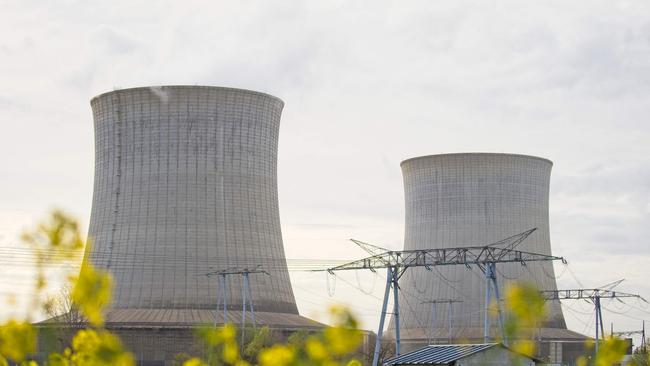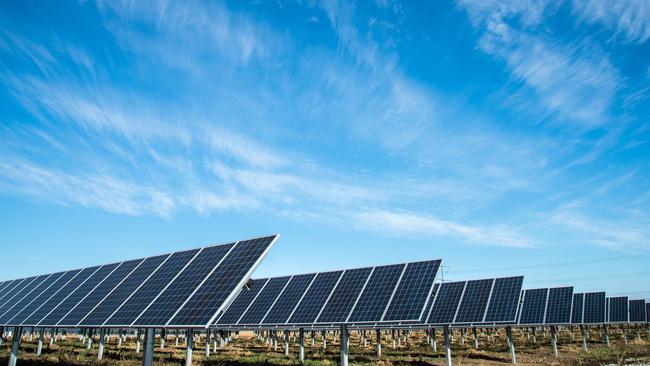Nuclear doesn’t stack up in Australia as Clean Energy Council slams ‘fantasy-driven’ debate
The renewable energy sector says nuclear makes sense in many countries but Australia, and a push by Peter Dutton risks hurting investment in the energy sector.
The Clean Energy Council says a push by politicians for nuclear energy is a “fantasy-driven” proposition that puts Australia at odds with global peers and undermines investment in the energy sector.
The body, which represents the renewable energy and energy storage industry, wants Australia to instead pursue a range of renewable projects that it says will produce power six times cheaper than nuclear, which could take over two decades to come online.
Chief executive Kane Thornton told The Australian that a protracted debate about nuclear power was a distraction and risked confusing the public and undermining investment confidence in new renewable energy generation.
“No one in their right mind thinks that nuclear power has a role in the electricity grid. No private investors are going to touch it, all the analysts, all the investors think it has no role to play,” he said on the sidelines of CEC Australian Large-Scale Solar & Storage Summit.
“It’s a silly political debate about something that will never materialise, and the virtue of having that debate has impacts. It will slow down the energy transition, drive up power prices and risk the lights going out.”
The Coalition has been under pressure to release its energy and climate change election policy, including locations and modelling on the viability of nuclear power. Peter Dutton has pledged that if elected, the Coalition could deliver the first small modular reactors into the grid by the mid-2030s, with British manufacturer Rolls-Royce understood to be able to deliver them at an estimated $3.5bn to $5bn each.

Mr Thornton said the CEC was not antinuclear and counted large nuclear companies as members that were building projects in Japan, Europe and the US, but added that the numbers did not stack up in Australia.
“We don’t have an ideological bent against nuclear other than those same companies acknowledge that nuclear makes sense in countries that have a nuclear industry and don’t have the renewable resources that we do,” he said.
“These companies are technology-agnostic and when they look at Australia they see that the solution is a suite of renewables: wind, solar, hydro, a bunch of storage solutions and a more modern grid.”
Nuclear power would also not produce electricity in Australia for the next two decades, according to Mr Thornton, who added that the sector also faced a hurdle in recruiting specialists from overseas, which would take time and would struggle to attract private investment.
“For the last 10 years we’ve been building that workforce, and we’ve now got a strong workforce in the energy sector,” he said.
“You’d be starting from zero on nuclear, and you’d have to say why would a nuclear engineer come to Australia when they’ve got experience, and they’re working in an already developed industry elsewhere.”

Mr Thornton said the renewable energy space was not afraid of competing against nuclear, but said many were concerned about having to justify itself in the face of “fantasy-driven and nonsensical distractions” which could make it hard to attract investment.
“If you’re an investor, you’re going to have to convince your board to put hundreds of millions of dollars into a renewable project in Australia when the alternative government has no renewable policy or has not said what their renewable targets are. It just creates uncertainty,” he said.
“It reminds them that they may only be one election away from having a government that has an energy policy that is fundamentally at odds with what’s happening globally.”
Chris Bowen has said the next election will be a “referendum on nuclear power” and undermined claims by Peter Dutton that all G20 nations except Australia have backed small modular reactor technology.
Mr Thornton said that investment in the renewable space was very strong at the moment and was benefiting from various levels of government and other players being on the same page.
“We’ve never had an alignment of governments, regulators, and investors at any stage in the past 20 years as we do now,” he said. “They’ve all got a common recognition that we are transitioning the energy system.”


To join the conversation, please log in. Don't have an account? Register
Join the conversation, you are commenting as Logout